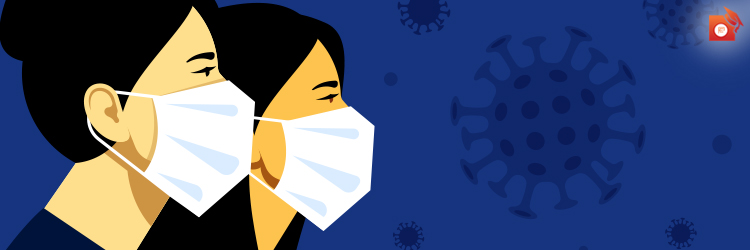Covid-19 - What is CoronaVirus? and How does it spread?
2020-03-23 | Team PendulumEdu

What is Coronavirus?
According to World Health Organization (WHO), Coronaviruses (CoV) comprise a family of viruses that cause illness like common cold and severe diseases like Middle East Respiratory Syndrome (MERS-CoV) and Severe Acute Respiratory Syndrome (SARS-CoV). A novel coronavirus (nCoV) (a virus that was not previously identified in humans) has been named SARS CoV 2, and the disease caused by it has been named as COVID-19.
Coronaviruses are zoonotic, which means that it can be transmitted between animals and people. After extensive research and investigations, researchers found that SARS-CoV transmitted from civet cats to humans while MERS-CoV transmitted from dromedary camels to humans. There are numerous coronaviruses which are present in animals but have not infected humans till now.
Symptoms of Coronavirus disease (COVID-19) include fever, cough, shortness of breath and breathing difficulties. In severe cases, the disease can cause pneumonia, severe acute respiratory syndrome, kidney failure and even death.
How Coronavirus spreads?
Coronavirus emerged from an animal source, and it is now spreading from person to person. The virus spreads mainly between people who are in close contact with one another
1. Person to person
- The virus spreads between people who are in close contact with one another or at least within 6 feet.
- When an infected person coughs or sneezes and the respiratory droplets enter in the mouths or noses of people in close contact or these droplets can be inhaled into their lungs.
2. Contact with contaminated surface or objects
- It may be possible that a person can be infected from coronavirus disease by touching a surface or object that has the virus on it and then touching their own mouth, nose or eyes.
- Researchers are not aware of the duration of the respiratory droplets remaining on the telephone screen. But they remain for a few hours, so it is necessary to clean the phone screen also.
3. Community area
- The virus that causes COVID-19 spreads quickly in the community of the most affected geographical area.
What Precautionary measures need to be taken?
- Wash your hands with soap and water especially after you have been in a public place, or after coughing, or sneezing.
- If soap and water is not available, then use a hand sanitizer that contains at least 60% alcohol. Apply all over your hands and rub them until they feel dry.
- Do not touch your eyes, nose, and mouth without washing your hands.
- Avoid close contact with any person who is sick.
- If COVID-19 is spreading in your community, maintain some distance between yourself and people.
- Stay home if you are sick and seek medical treatment.
- Cover your mouth with a napkin when you sneeze or cough.
- Throw used tissues in the dustbins.
- Wear good quality facemask when you are surrounded by people.
- Clean and disinfect frequently touched surfaces either with a disinfector or detergent and water, which includes tables, doorknobs, light switches, countertops, handles, desks, phones, keyboards, toilets, faucets, and sinks.
- Maintain social distancing with animals.
- Avoid sharing personal items like dishes, drinking glasses, cups, eating utensils, towels, or bedding with people or pets in your home.
At present, there is no vaccine available for COVID-19, and the researchers are working on it worldwide. The advisory has been issued by the government to stay at home and reduce close contact with people. Wash hands regularly with soap and alcohol-based sanitizers. Wear masks while stepping out of the house. Let’s be a responsible citizen and fight together with COVID-19.
Share Blog





Comments